The growing demand for AI-powered solutions in software development is undeniable. According to Statista, a leading market, and consumer data provider, the global market for AI in software development is projected to reach a staggering $43.26 billion by 2027. This reflects a compound annual growth rate (CAGR) of 33.54%, signifying a significant upward trend in adopting AI tools within the software development industry. This surge is fueled by factors like the need for faster development cycles, reduced costs, and the ability to automate repetitive tasks.
The ever-growing complexity of applications, coupled with the relentless demand for faster development cycles, pushes the boundaries of innovation. To meet these challenges, developers embrace new tools and technologies that streamline processes and enhance efficiency. One groundbreaking development is Devin AI created by Cognition Labs, a US-based applied AI company.
Devin isn't just another code completion tool or a bug detection script. It's the world's first fully autonomous AI software engineer. This isn't mere marketing hyperbole. Devin possesses a unique blend of machine learning and AI development that empowers it to tackle various software development tasks, fundamentally changing how software is built. Now, let's delve deeper into Devin's AI capabilities in detail.
What is Devin AI?
Devin AI: A Revolutionizing Software Development with the World's First AI Engineer. Imagine a tireless teammate who can code, debug, and tackle complex projects alongside you. That's the power of Devin AI, the world's first fully autonomous AI software engineer. Developed by Cognition Labs, Devin is poised to transform the software development landscape by automating tasks, boosting efficiency, and empowering human engineers to focus on innovation.
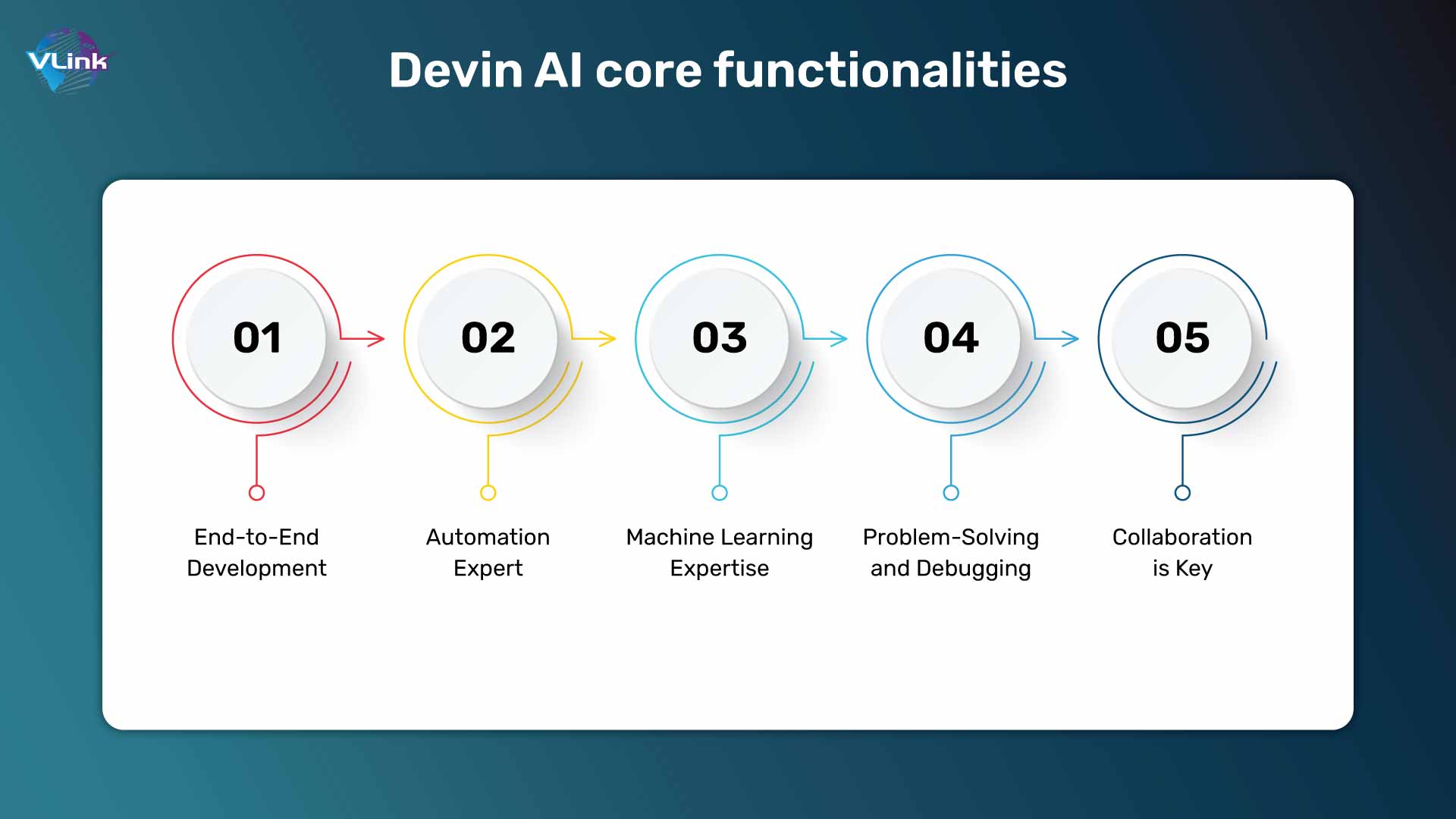
Devin AI isn't just another coding assistant. It's a full-fledged AI teammate with advanced capabilities beyond basic automation. Here's a closer look at Devin's core functionalities that set it apart:
- End-to-End Development: Devin can translate a nascent project concept into a functional application. This includes designing the underlying architecture, writing clean and maintainable code, and seamlessly integrating various components.
- Automation Expert: Devin excels at automating repetitive, time-consuming tasks that often bog down developers. These include code generation, writing unit tests, and generating comprehensive documentation. Automating these tasks frees up valuable and skilled developers time for focusing on more strategic initiatives.
- Machine Learning Expertise: Devin leverages sophisticated machine learning algorithms to learn and improve its performance continuously. It can analyze vast code repositories and identify patterns to optimize its coding practices, ensuring code that adheres to best practices and industry standards.
- Problem-Solving and Debugging: Debugging complex software issues can be frustrating and time-consuming. Devin's AI capabilities enable it to analyze code, pinpoint potential errors, and suggest solutions, significantly accelerating debugging.
- Collaboration is Key: Devin isn't designed to replace human engineers. It thrives in a collaborative environment, working alongside developers, accepting feedback, and iterating on designs as needed.
While numerous AI-powered tools assist developers with specific tasks like code completion or bug detection, Devin goes beyond mere assistance. It functions as a full-fledged teammate, capable of handling entire projects—from the initial spark of an idea to the final lines of code.
How is Devin AI Trained?
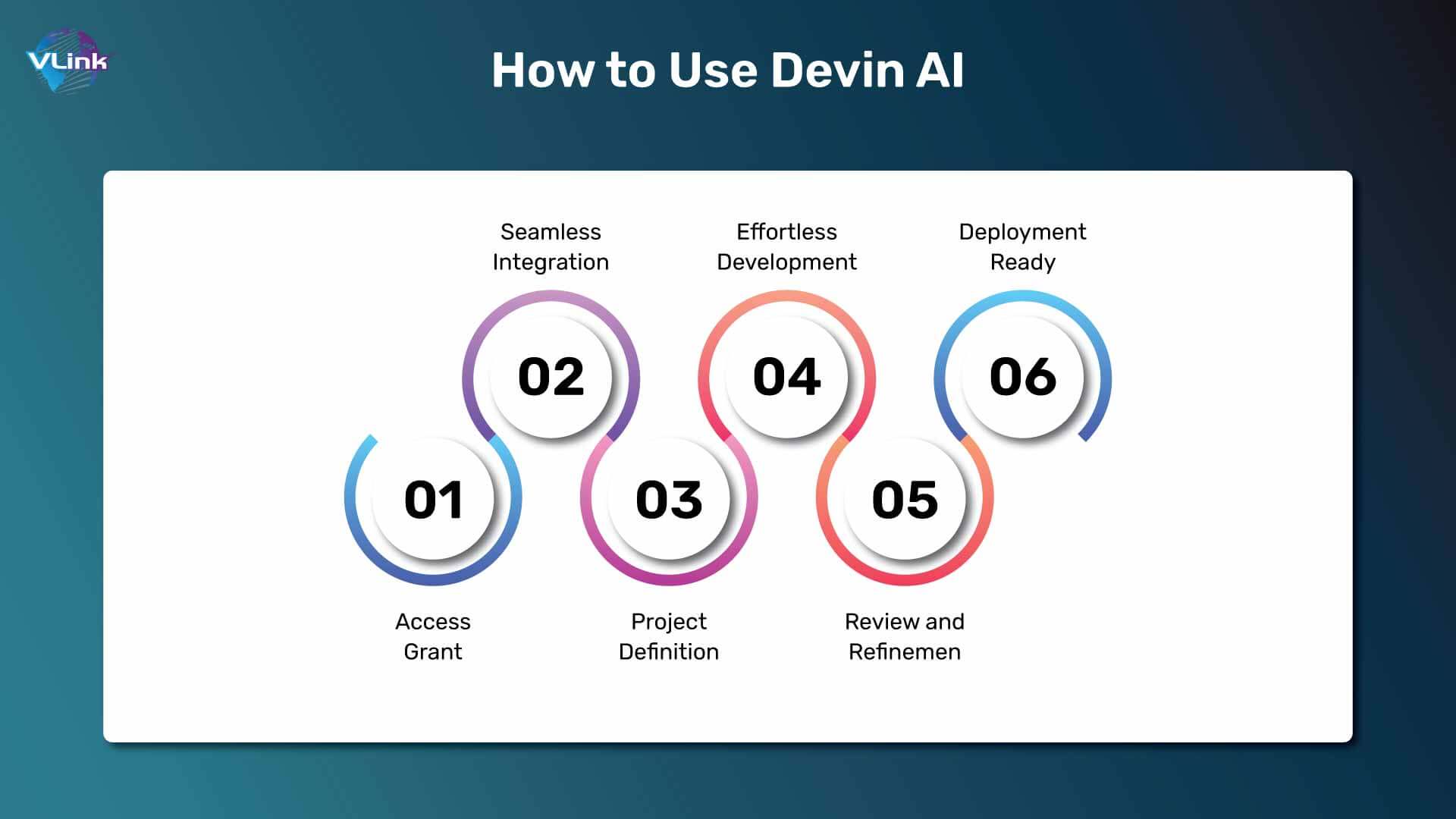
Devin's training involves a multi-pronged approach:
- Massive Data Ingestion: Devin is fed a vast amount of data, including code repositories, technical documentation, and best practices. This allows it to understand programming languages, grasp software development principles, and learn from real-world examples.
- Reinforcement Learning: Devin learns through trial and error like a human programmer. It receives feedback on its outputs, allowing it to identify and correct mistakes, continuously enhancing its performance.
- Human Expertise Integration: While Devin constantly learns, human developers play a crucial role in its development. They provide guidance, curate training data, and ensure Devin's capabilities align with real-world software engineering needs.
How to Use Devin AI
Devin AI promises to revolutionize the development workflow by introducing an AI-powered teammate for software engineers. Here's a breakdown of the potential process for leveraging Devin's capabilities:
1. Access Grant: Your Gateway to AI Collaboration
The first step is to obtain access to Devin AI. This might entail submitting a request through Cognition Labs’ website or designated channels. Stay tuned for updates on how to join the early access program or future availability.
2. Seamless Integration: Devin Meets Your Workflow
Once approved, you'll integrate Devin AI with your existing development environment. This streamlined process ensures Devin can access your preferred tools and coding languages seamlessly.
3. Project Definition: Charting the Course for Success
Next comes the exciting part: defining your project. Provide Devin with clear instructions outlining the software you envision, including its functionalities and desired features. The more specific you are, the better Devin can understand and translate your requirements into code.
4. Effortless Development: Watch Your Codebase Grow
Devin will then independently take the full development cycle. It will access relevant resources and start writing code based on your specifications. This empowers you to focus on higher-level strategic aspects of the project while Devin handles the coding work.
5. Collaborative Review and Refinement: Perfecting the Code
Upon completion, you can review Devin's meticulously generated code. This collaborative approach allows you to make necessary adjustments and ensure the code aligns perfectly with your vision.
6. Deployment Ready: Taking Your Software Live
With your final stamp of approval, Devin AI might even assist in deploying the finished software. This comprehensive assistance streamlines the development process, saving you valuable time and resources.
Note: - This is a simplified overview, and the actual steps might vary depending on Devin AI's final release and functionalities. Stay tuned for updates as Devin continues to develop!
How Does Devin AI Work?
Here's a glimpse into Devin's AI-powered workflow:
- Understanding Your Needs: Devin starts by comprehending your project requirements. You can provide detailed specifications or a high-level overview, and Devin will use its knowledge base to translate that into actionable steps.
- Planning and Execution: Devin excels at long-term planning. It can break down complex projects into manageable tasks, prioritize effectively, and navigate unforeseen challenges. Throughout the process, Devin keeps you informed and open to feedback.
- Coding with Confidence: Devin can generate clean, efficient code that adheres to best practices. It can work with various programming languages and frameworks, adapting to the specific needs of your project.
- Continuous Improvement: Devin doesn't stop after completing a task. It analyzes its work, identifies areas for improvement, and refines its approach for future projects.
Devin AI represents a significant leap forward in software development. By automating repetitive tasks and collaborating with human engineers, Devin has the potential to accelerate innovation, improve project outcomes, and usher in a new era of software creation.
The Benefits of Utilizing Devin AI
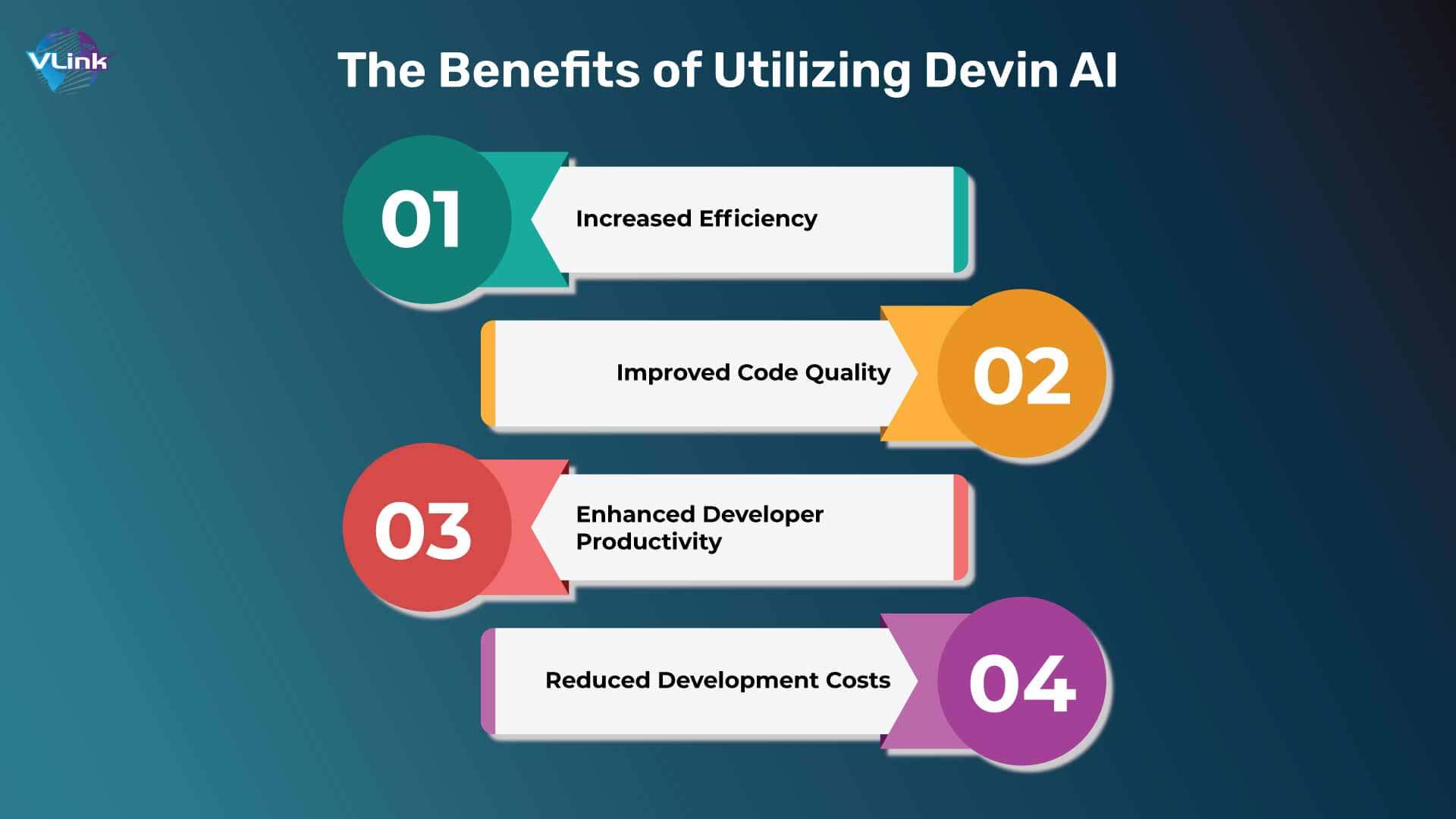
The introduction of Devin AI presents several advantages for software development teams, fostering a more efficient and productive environment:
- Increased Efficiency: Devin significantly reduces development time by automating repetitive tasks and streamlining development processes. This allows teams to deliver projects faster and meet tight deadlines more consistently. A study by McKinsey suggests that AI-powered tools can automate up to 40% of repetitive software development tasks, freeing up developer time for higher-level activities.
- Improved Code Quality: Devin's ability to analyze vast code repositories and identify best practices ensures consistently high-quality code. This translates to fewer bugs, more reliable applications, and lower maintenance costs in the long run.
- Enhanced Developer Productivity: By handling repetitive tasks, Devin frees up developer time to focus on core competencies like creative problem-solving, system design, and user experience design. This allows developers to leverage their expertise to build innovative and user-centric applications.
- Reduced Development Costs: With faster development cycles and improved code quality, Devin can potentially lead to significant cost savings for software development projects. A study by Deloitte suggests that AI-powered tools can help reduce software development costs by up to 20%.
The Difference Between Devin AI and Existing AI Tools
While Devin AI might sound like science fiction, it's the real deal – the world's first AI software engineer. But how does it stack up against existing AI coding assistants? Let's break down the key differences to help you understand where Devin shines:
Level of Autonomy:
Here's the biggest differentiator. Devin is a self-starter, unlike existing tools like GitHub Copilot and Tabnine, which require constant human input and guidance. It can take on entire projects, from initial conception to final deployment, working independently based on your specifications. This frees you to focus on the bigger picture – innovation and strategic decision-making.
Project Scope:
Think of Devin as your end-to-end development partner. It tackles complex projects, handling coding, debugging, and deployment. Existing assistants excel at specific tasks within a project, like suggesting code snippets or variable names. While valuable, they only handle part of the software development lifecycle.
Code Generation:
Devin goes beyond basic code suggestions. It can generate entire code blocks, saving you time and effort. Existing tools focus on suggesting smaller code snippets for specific lines you're working on.
Debugging Prowess:
Debugging can be a time-consuming task. Devin takes the pain out of the equation by identifying and fixing bugs within your project. Existing assistants have limited debugging capabilities, leaving you to troubleshoot issues manually.
Learning and Improvement:
Devin is a fast learner. It continuously improves its skills by analyzing data and past projects. Existing assistants primarily learn from your coding style and preferences. While helpful, Devin has different independent learning capabilities.
Integration:
Devin might require initial integration with your existing workflow, but it's designed to work seamlessly with your development environment. Existing assistants like Copilot and Tabnine integrate effortlessly with popular IDEs, making them readily accessible within your current setup.
Devin AI represents a paradigm shift in AI-powered coding assistance. It's more than just an assistant; it's a full-fledged teammate with the autonomy and capabilities to handle complex projects. While existing tools offer valuable code suggestions and automation, they must match Devin's end-to-end project management and independent problem-solving skills. As Devin continues to evolve, it has the potential to revolutionize software development, freeing human engineers to focus on the truly innovative aspects of the field.
Now, let's check out how Devin AI impacts software development in detail.
How Will Devin AI Impact Software Development?
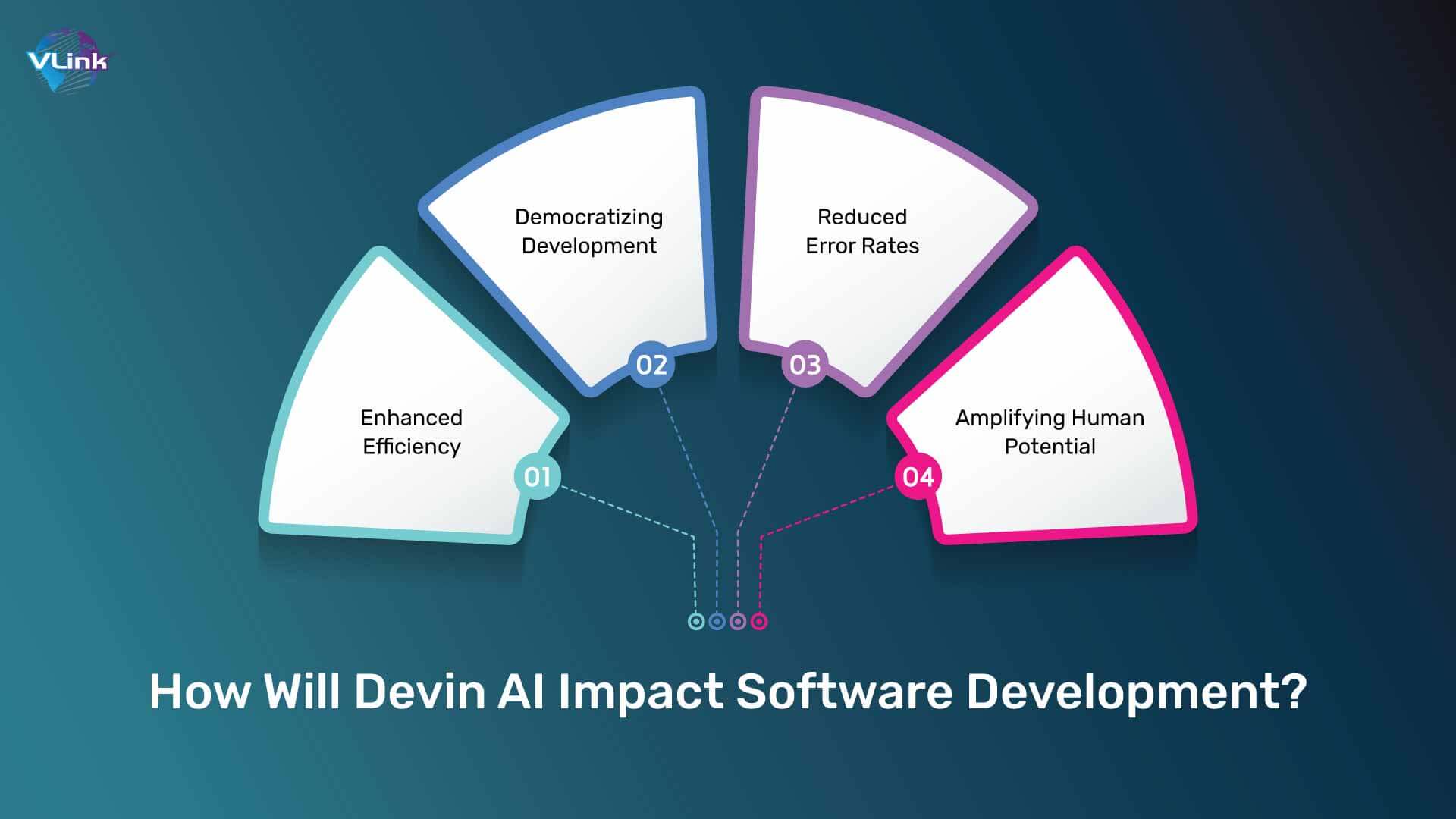
Devin AI, developed by Cognition Labs, is making waves in the tech industry. Touted as the world's first AI software engineer, Devin promises to be a game-changer for software development. But what exactly does this mean for the future of coding? Let's delve into how Devin AI will impact software development and how it differs from existing AI coding assistants.
Devin AI isn't just another code-writing tool. It's a full-fledged teammate with the potential to revolutionize the software development landscape. Here's how:
- Enhanced Efficiency: Devin tackles entire projects, from concept to code, automating repetitive tasks and freeing up human developers for more strategic thinking and innovation. This translates to faster development cycles and quicker time-to-market.
- Democratizing Development: Devin's capabilities can empower those less familiar with coding to build basic applications. This opens doors for citizen developers and fosters a more inclusive development environment.
- Reduced Error Rates: Devin's ability to learn from past experiences and identify patterns can significantly reduce bugs and errors in code, resulting in more robust and reliable software.
- Amplifying Human Potential: Devin is a tireless collaborator who cares about hard work. At the same time, human developers can focus on tackling complex problems and pushing the boundaries of software creation.
Industries Impacted by Devin AI
The impact of Devin AI extends far beyond the realm of traditional software development. Here are some industries poised for significant transformation:
FinTech: Devin can streamline the development of complex financial applications, ensuring faster innovation and enhanced security measures.
Healthcare: Devin can play a crucial role in developing healthcare software accelerating the creation of diagnostic tools and treatment applications.
Manufacturing: Devin can optimize production lines, automate quality control processes, and expedite the development of industrial automation systems.
E-commerce: Devin can personalize customer experiences, optimize inventory management, and power the creation of next-generation e-commerce platforms.
These are just a few examples, and the potential applications of Devin AI are vast. As this technology continues to evolve, we can expect it to reshape industries across the board, ushering in unprecedented efficiency and innovation.
Beyond Automation: How Devin AI Differs
Existing AI coding assistants primarily focus on automating specific coding tasks like code completion or bug fixing. Devin AI, however, takes a more comprehensive approach:
- End-to-End Development: Devin can handle the entire software development lifecycle, from planning and design to coding, deployment, and maintenance.
- Independent Problem-Solving: Devin possesses advanced problem-solving and critical thinking capabilities, allowing it to tackle complex challenges without constant human intervention.
- Machine Learning Prowess: Devin leverages machine learning algorithms to continuously improve their skills and adapt to new technologies and coding practices.
- Real-World Tested: Unlike many AI tools still under development, Devin has reportedly passed practical engineering interviews and completed real-world projects.
Devin AI's arrival marks a significant step towards AI-powered software development. While its long-term impact remains to be seen, one thing is sure: Devin has the potential to reshape the development landscape, making it faster, more efficient, and more accessible than ever before.
The Future of Devin AI in Software Development
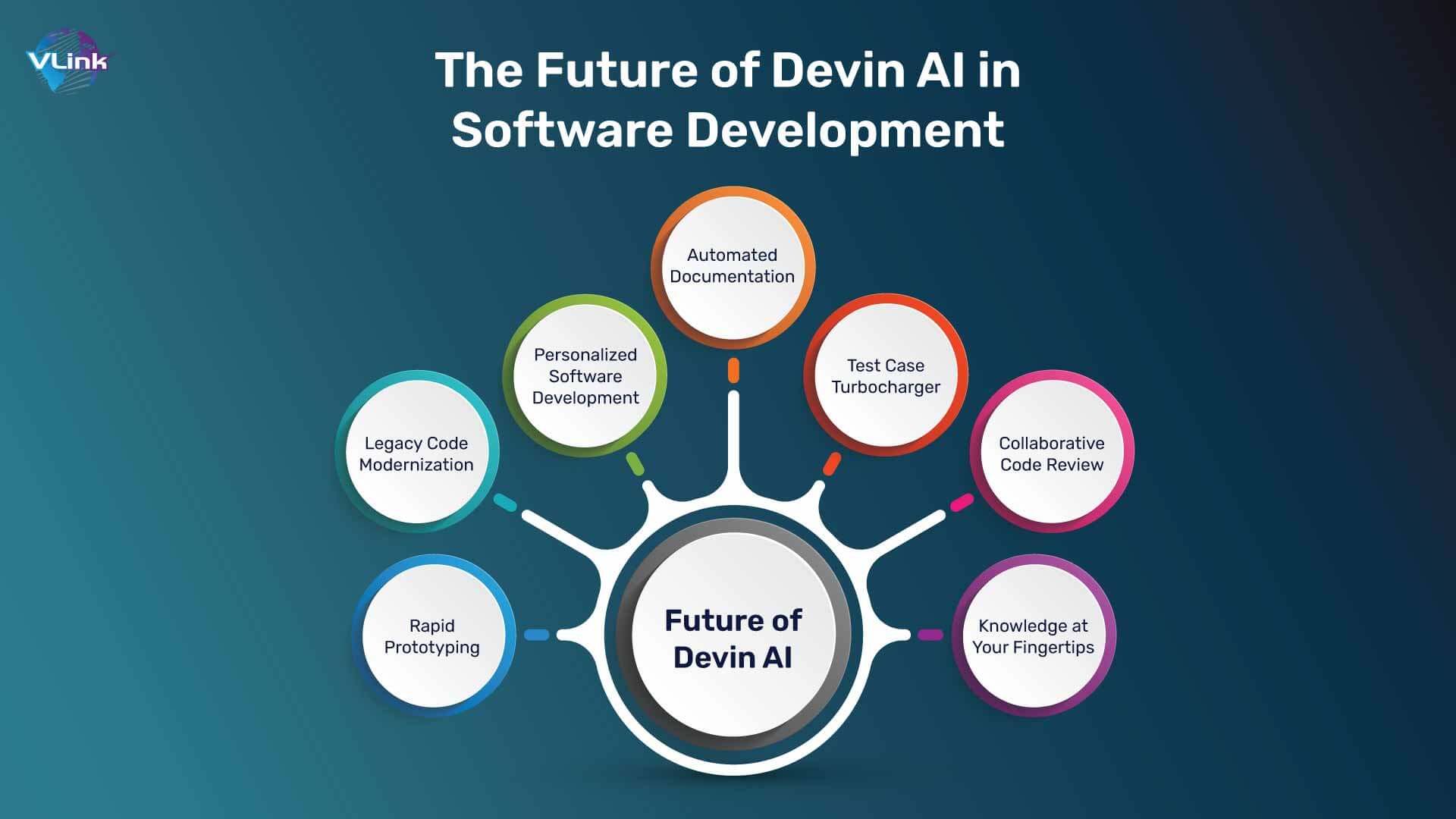
Devin AI marks a significant step forward in integrating AI within the software development landscape. While it's still under development, Devin's capabilities showcase AI's immense potential to transform the development cycle.
While Devin AI is still developing, Cognition Labs has outlined some potential real-world applications showcasing how Devin AI can empower developers and revolutionize the way software is built:
- Rapid Prototyping: Imagine sketching a new software feature and having Devin translate that concept into a functional prototype within minutes. This rapid prototyping capability can significantly accelerate the early stages of development, allowing teams to validate ideas quickly and iterate on designs efficiently.
- Legacy Code Modernization: Many companies need help with maintaining outdated legacy codebases. Devin's ability to analyze code and suggest improvements can streamline modernization. Devin can identify areas for refactoring, suggest code optimizations, and even assist in migrating code to newer frameworks.
- Personalized Software Development: AI tools like Devin could create customized software experiences in the future. Imagine AI analyzing user data and preferences to generate custom software interfaces or suggest features tailored to individual needs.
- Automated Documentation: Detailed documentation is crucial, but it's often a time-consuming chore. Devin can automatically generate comprehensive API documentation from existing code, saving developers countless hours and ensuring projects have up-to-date documentation.
- Test Case Turbocharger: Writing thorough test cases is essential for robust software but can be tedious. Devin can analyze code and automatically generate relevant test cases, ensuring comprehensive coverage and reducing the risk of bugs slipping through the cracks.
- Collaborative Code Review: Code reviews are vital for maintaining code quality, but scheduling conflicts and reviewer fatigue can slow things down. Devin can act as an impartial AI code reviewer, highlighting potential issues and suggesting improvements, streamlining the review process, and fostering a culture of continuous improvement.
- Knowledge at Your Fingertips: Stuck on a coding challenge? Devin can be your virtual encyclopedia. Integrate Devin with your development environment to provide real-time access to relevant code snippets, best practices, and solutions from vast online repositories, empowering developers to tackle challenges with newfound efficiency.
Devin AI represents a significant leap forward in human-AI collaboration within software development. By automating tedious tasks, identifying potential pitfalls, and providing real-time support, Devin empowers developers to focus on what they do best: building innovative and impactful software solutions.
Challenges for Devin AI in Software Development
Despite the exciting potential of AI in software development, there are still challenges to overcome:
- Data Quality and Bias: AI algorithms are only as good as the data they are trained on. Ensuring high-quality, unbiased data sets is crucial for training effective AI development tools. Bias in training data can lead to biased algorithms, which can produce flawed software.
- Security Concerns: As AI becomes more integrated into software development, security vulnerabilities become a concern. Mitigating potential security risks associated with AI tools is essential for building trust and ensuring the integrity of software applications.
- The Human Factor: While AI can automate tasks and improve efficiency, human expertise remains crucial for software development. Ensuring successful human-AI collaboration and fostering a culture of trust between developers and AI tools is paramount.
- Transparency and Explainability: Developers need to understand how AI tools like Devin arrive at their recommendations. Transparency in AI decision-making processes fosters trust and allows developers to make informed decisions.
- Human Oversight: While AI can automate tasks, human oversight remains crucial. Developers must be involved in the development process to ensure that AI tools are used responsibly and ethically.
- Continuous Learning and Improvement: AI tools like Devin constantly learn and evolve. Developing mechanisms for constant learning and improvement ensures that AI tools remain practical and relevant in the ever-changing software development landscape.
How AI Will Reshape Software Engineer Roles
The introduction of AI tools like Devin will undoubtedly impact developer roles. However, this is not necessarily a negative development. Here's how AI might reshape the developer landscape:
- Shifting Focus: With AI automating repetitive tasks, developers can shift their focus toward higher-level activities. This could include strategic planning, system design, and user experience design.
- The Rise of the Developer-AI Specialist: A new breed of developer might emerge—the developer-AI specialist. These developers will deeply understand software development methodologies and AI principles, allowing them to bridge the gap between humans and AI tools effectively.
- Lifelong Learning: The software development landscape is constantly evolving. As AI plays a more prominent role, developers must continuously learn and adapt their skill sets to remain competitive.
Devin AI: Partner or Replacement for Developers?
A common concern surrounding AI-powered tools like Devin is the potential for job displacement in the software development industry. However, Cognition Labs, the developers behind Devin, emphasize that Devin is designed to be a collaborative partner, not a replacement for human developers.
Devin's true strength lies in its ability to automate repetitive tasks and augment the developer's skillset. Developers can leverage Devin's expertise to focus on core competencies like creative problem-solving, system design, and user experience design. This fosters a collaborative environment where humans and AI work together to build better software.
AI Can't Replace Developers
Despite the hype surrounding AI, it's important to remember that AI is a tool, not a replacement for human developers. Here's why the human touch remains irreplaceable:
- Creativity and Problem-Solving: Coming up with innovative solutions and tackling unforeseen challenges requires genuine human creativity and critical thinking skills. AI can assist in these processes but cannot replicate human ingenuity.
- Understanding User Needs: Developing software that genuinely resonates with users requires understanding human psychology, emotions, and behavior. AI can analyze data, but human empathy and emotional intelligence are crucial for creating user-centric designs.
- Ethical Considerations: As AI plays a more prominent role in software development, ethical considerations become paramount. Developers with solid ethical frameworks will be needed to ensure that AI tools are used responsibly and avoid perpetuating bias or discrimination.
The Future of AI in Software Development
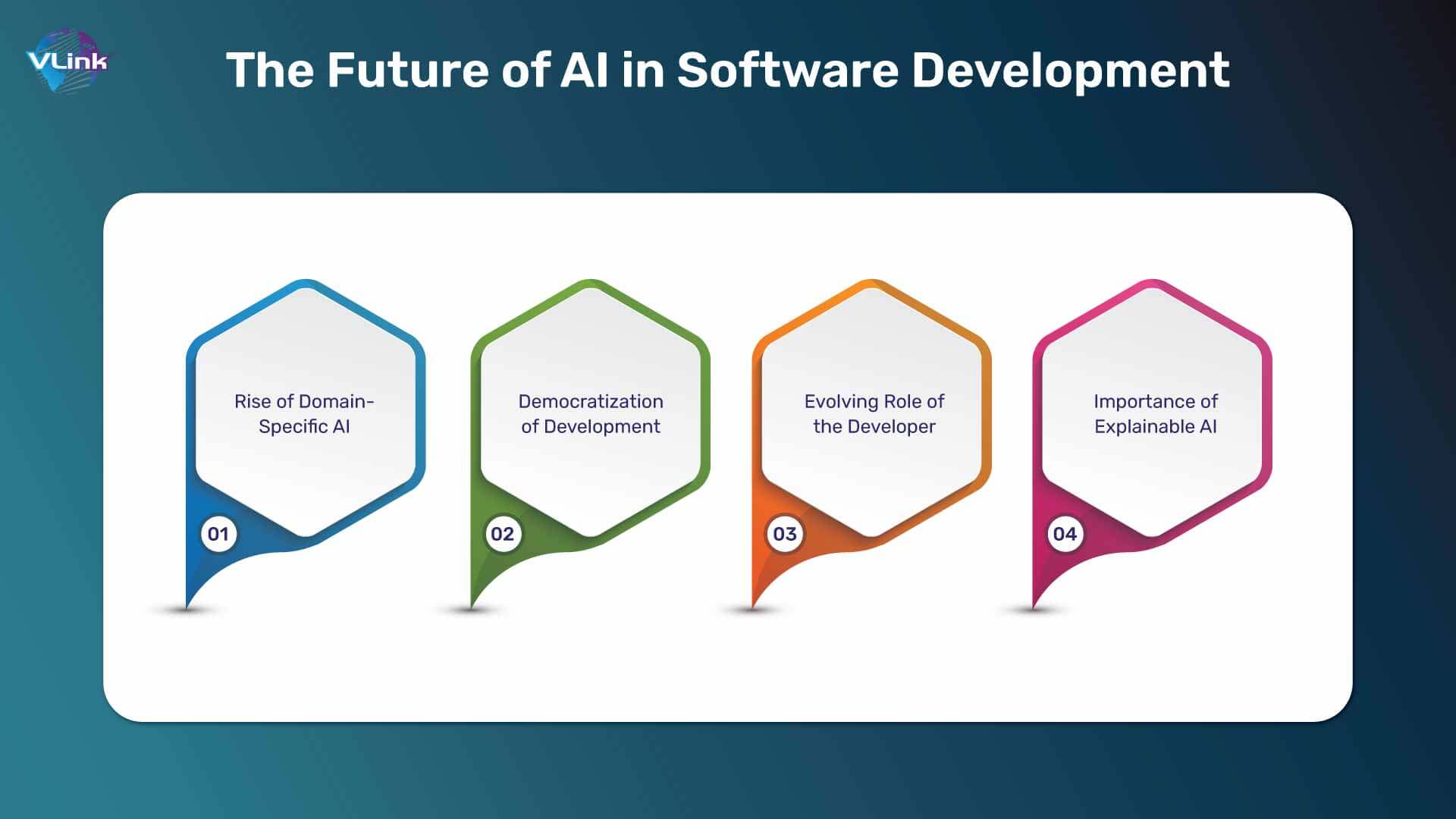
Devin AI represents a significant leap forward, but it's merely the first chapter of AI's impact on software development. Here's a glimpse into what the future holds:
The Rise of Domain-Specific AI:
General-purpose AI tools like Devin lay the groundwork, but the future belongs to specialized AI solutions. Imagine AI designed for healthcare applications that understand medical terminology and regulatory requirements.
Similarly, AI tailored for the finance industry could grasp complex financial models and identify potential risks. These domain-specific AI tools will significantly enhance efficiency and accuracy within their respective fields.
The Democratization of Development:
Traditionally, software development has been a complex field requiring specialized skills and knowledge. AI-powered tools like Devin have the potential to democratize development, making it more accessible to a broader range of users.
Imagine citizen developers with limited coding experience leveraging AI tools to create basic applications or customize existing software to suit their needs. This could revolutionize various industries, empowering individuals and fostering more significant innovation.
The Evolving Role of the Developer:
As AI automates repetitive tasks, the developer's role will undoubtedly transform. The focus will shift towards higher-level thinking and strategic activities. Here are some ways developers might adopt:
- Software Architects: Why Your Company Needs UI/UX Design Services? The future belongs to complex software systems, with developers at the helm of intricate structures that weave together services and AI components. But imagine a marvel of engineering rendered useless – that's the risk of neglecting UI/UX design. Here's where UI/UX design steps in.
- UX/UI Specialists: Hiring a dedicated UI/UX developer unlocks several benefits for your AI product. They craft user-friendly interfaces specifically designed for AI interaction, boosting engagement and conversions. This expertise also streamlines development, saving costs, and builds a strong brand image – all crucial for successful human-AI interaction.
- Data Scientists and AI Specialists: As AI becomes more integrated into development, developers with a strong understanding of data science and AI principles will be highly sought after. These developers will bridge the gap between traditional software development and the world of AI.
The Importance of Explainable AI (XAI):
One of the biggest challenges with AI is the concept of a "black box." Often, AI models arrive at decisions through complex algorithms that are difficult for humans to understand. This lack of transparency can hinder trust and adoption.
The future of AI development necessitates focusing on Explainable AI (XAI). XAI tools will allow developers to understand how AI arrives at its recommendations, fostering trust and enabling developers to make informed decisions based on AI insights.
The future of software development is a collaborative landscape where humans and AI work together. By leveraging the strengths of AI for automation and data analysis and combining it with human creativity, problem-solving skills, and empathy, we can build a future filled with innovative, user-centric software that tackles the world's most pressing challenges.
Create AI-powered Software with VLink
Leverage VLink‘s AI development expertise to turn your innovative concepts into intelligent software solutions. VLink empowers businesses to integrate custom AI functionalities seamlessly, propelling their software to the cutting edge.
Our AI-powered Software Development Services Include
- Concept Ideation and Feasibility Analysis: Our dedicated team collaborates with you to refine your AI-powered software vision, assess technical viability, and identify the optimal approach for success.
- Data Acquisition and Preparation: High-quality data is the cornerstone of robust AI models. VLink assists in data collection, structuring, and cleansing to strengthen your AI foundation.
- Custom AI Model Development: Our AI specialists tailor machine learning algorithms specific to your software's needs, whether natural language processing, computer vision, or predictive analytics.
- Model Integration and Deployment: VLink integrates your custom AI model into your software application, ensuring smooth operation and scalability.
- Ongoing Support and Maintenance: We provide continuous support to monitor your AI model's performance, refine it over time, and ensure it adapts to evolving needs.
Why Choose VLink for AI Software Development?
- Extensive AI Expertise: Our team possesses in-depth knowledge of machine learning frameworks, deep learning architectures, and AI best practices.
- Customizable Solutions: We prioritize understanding your unique software goals and tailor the AI integration accordingly.
- Focus on Efficiency and Scalability: VLink optimizes your AI model for performance and ensures it can grow alongside your software's user base.
- Transparent Development Process: We maintain clear communication throughout the development lifecycle, keeping you informed and involved.
That's all for now! Stay tuned for further updates on Devin AI. We will keep you posted as exciting news unfolds in the upcoming years. Don't wait to contact us and harness the power of AI to join the forefront of software development.
Wrapping Up!
The arrival of Devin AI marks a significant step forward in integrating AI within the software development industry. While there are challenges to overcome and ethical considerations to address, the potential benefits of AI-powered development tools are undeniable.
By fostering a collaborative environment where humans and AI work together, the software development industry can leverage the power of AI to build a brighter future for software creation. This future will be characterized by faster development cycles, higher-quality software, and a new era of innovation driven by the combined creativity of humans and AI.
Frequently Asked Questions
Devin AI is a groundbreaking AI tool developed by Cognition Labs. Touted as the world's first fully autonomous AI software engineer, Devin can handle entire software development projects, from concept to code. It automates repetitive tasks, improves code quality, and assists developers in building better software.
Devin AI benefits developers in several ways:
- Increased Efficiency: Devin automates repetitive tasks, allowing developer time for more strategic initiatives.
- Improved Code Quality: Devin analyzes code and suggests improvements, leading to higher-quality software with fewer bugs.
- Enhanced Productivity: Developers can focus on their core competencies, problem-solving, and user experience design while Devin handles repetitive tasks.
- Reduced Development Costs: Faster development cycles and improved code quality can lead to significant cost savings.
No, Devin AI is designed to be a collaborative partner, not a replacement for human developers. Devin automates tasks and augments developer skills, allowing them to focus on higher-level activities.
Some challenges associated with AI in software development include:
- Data Quality and Bias: Training data must be high-quality and unbiased to avoid biased algorithms and flawed software.
- Security Concerns: Mitigating potential security risks associated with AI tools is crucial.
- The Human Factor: Successful human-AI collaboration and fostering trust between developers and AI tools is essential.
The future of AI in software development is promising. We can expect advancements in areas like:
- Natural Language Processing (NLP): Improved NLP will enable developers to interact with AI tools using natural language, simplifying collaboration.
- Domain-Specific AI Development: AI tools tailored towards specific software development domains (e.g., healthcare, finance) will emerge.
- Greater Explainability and Transparency: Developers will increasingly demand transparency in AI decision-making processes.








